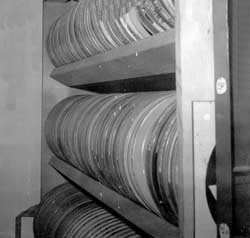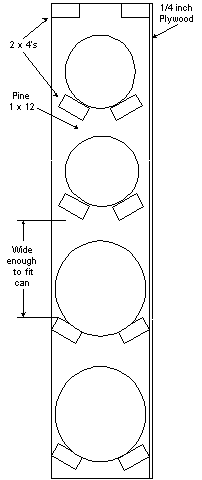
My homemade rack is sized to fit 800' and 1200' reels. You can make your version to fit your needs. It will hold more films than the commercial racks because there are no dividers, and the shelves are optimized to your needs. The materials are relatively cheap, and it can be made quickly with only a hammer and a hand saw.
The shelves are made of two 2x4's at an angle. Cut these 46 1/2 inches long. The ends are pine 1 x 12. You could also use 3/4 inch plywood cut to size, but this is more cutting I wouldn’t use particle board, it isn’t strong enough. When determining the height of the rack, be sure that it is not too tall to tilt up to a vertical position. A piece of 1/4 inch plywood is nailed to the back to make it sturdy. Diagonal braces could be substituted to reduce cost, but it wouldn't be as strong.
Cut the 1 x 12s about 9 inches shorter than you ceiling so that you will be able to tilt it up. Use film cans to do a layout on one of the boards. Make sure that you will be able to get the cans out between the 2 x 4s. Mark the position of the 2 x 4s on both boards. Nail them to one board and then to the other. Now nail the 1/4 inch plywood to the back. Stand it up, and load with films.
